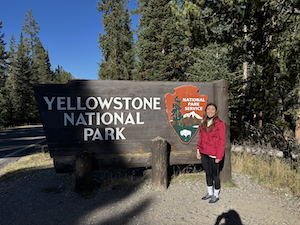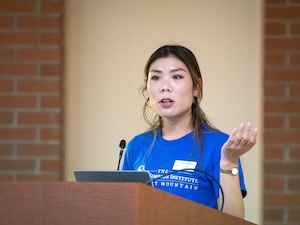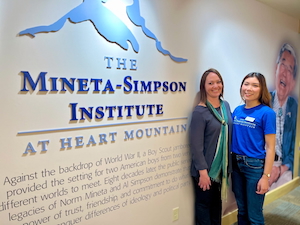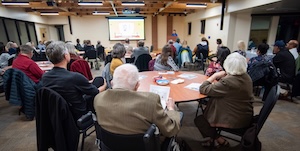Haruka Takaku on JOI, Heart Mountain, and Life in Wyoming
Published March 07, 2025
Haruka Takaku is a JOI (Japan Outreach Initiative) Coordinator for the Heart Mountain Wyoming Foundation. She recently started her two-year appointment in August 2024, working in Cody, WY to strengthen ties between Wyoming and Japan, share Japanese culture, and grow relationships across the state. She is the second JOI Coordinator in Wyoming, following the end of Yuki Ayukawa’s term at the University of Wyoming. Haruka’s appointment to the Heart Mountain Foundation is a continuation of the JOI Program’s dedication to supporting Wyoming.

Haruka Takaku at Yellowstone National Park
In a recent interview with Greg Ronco, Haruka shared her Wyoming experience.
Greg: Why did you want to be a JOI coordinator?
Haruka: Well, I think it's because the JOI program is really focused on the cultural exchange, and I think culture is very powerful. So that's why I ended up applying to be a JOI coordinator.
Where I was born and raised in Kanagawa, just south of Tokyo, I grew up around immigrants. And I would say at that time, not many cities had such an international kind of environment at that time.
But in my city, my hometown used to have a residential area of Nissan, so many immigrants lived there. I was surrounded by mostly South American, Latino people. And for me, the differences were so cool. I was so fascinated by their food and culture and language.
Because of that environment, I was really interested in other countries and different cultures. When I went to university in Yokohama, I studied international studies. And after graduating university, I also did my master’s in international studies. Then I worked for a travel agency focusing on educational tours. All the tour we provided really focused on the history, people, and culture.
Because of COVID I had to switch my job. Once COVID was over, I wanted to try a next step, and that’s when I applied for JOI.
Greg: And had you ever been to the United States before?
Haruka: Yes, I have. I visited United States three times before JOI, but all of the travel was in California. Living in Wyoming is very, very different.
Greg: I get that. Before I moved to Wyoming, I had only been to Yellowstone once when I was a teenager. And I have friends in Boston who don't know where Wyoming is.
Haruka: Yes, exactly. That's what my friends in California always told, like, “Where's Wyoming?” And when I tell them about my daily life, they will kind of get culture shock, even though they're American. But Wyoming is very, I would say, different.
Before JOI, I had been working in Tokyo about seven or eight years. So, living in Wyoming, living in Cody is a huge, huge life change for me. But I love it. Life in Tokyo is kind of hectic and I was literally commuting every day with a fully packed train. And that, you know, that's not fun. But here [in Cody], you never experience that, so I like how much more relaxed it is here.
Greg: What has been different about life in Wyoming than life in Kanagawa and Tokyo?
Haruka: Well, the food is definitely different. I still miss Japanese food sometimes, but luckily Cody has one Japanese restaurant surprisingly, that is owned by Japanese people. Their food is pricey, in my opinion, but still, I think that this small town having a Japanese restaurant is pretty cool, and many local people visit there and eat.
But I definitely miss Japan’s Japanese food. The closest Japanese market is in Denver, which takes seven or eight hours driving and that's hard. So, I use internet shopping. Except fresh vegetables and fish, I pretty much can get most things from online shopping.
And now I live in a three-bedroom, huge house. In Kanagawa, I was living in the tiniest apartment in. Interestingly, sometimes I feel like I miss the compact space. But the people are very nice, very kind. That's good. Overall, I am enjoying my Cody life and my Wyoming life.
Greg: I am curious from a food perspective, what has, what is your favorite American food that you've had here? Or your favorite Wyoming food?
Haruka: Well, burgers, pizza, donuts, they're much better than Japan. They're so good. I think the American people are very good at making high calorie food.
Greg: That is certainly a strength of ours. And what has your experience been building community?
Haruka: My supervisor, Aura Newlin, takes me to connect with local people. Like she invited me to the community Christmas party and introduced me to many local people. Also, my house owner’s family, they're very kind. They invited me to their Thanksgiving and to dinner. And Heart Mountain has another intern, and he introduced me the younger generation.

Haruka Takaku presenting at a workshop for the Heart Mountain Foundation
I recently had a chance to connect with Northwest College students and they actually have many Japanese students, which was surprising. Hopefully I can build more relationships with the college, as well.
So yeah, I am building up my relationships in the local community, and it has been great.
Greg: What is your daily life like in Cody?
Haruka: Since it's winter, it's not Yellowstone season, so our museum is only open to public Wednesday through Saturday. We are on winter hours. That was my one of my culture shocks. I am full time staff, so I am working Monday through Friday, but I’m only in the office Wednesday through Friday.
Right now. I am basically working on my project, which is workshops in the museum and the local community, such as libraries and local schools. And then, I did my very first event in November, and then had another event in the museum, which was a Japanese New Year and mochi tasting event.
I’ve also had two calligraphy workshops in local libraries, and this week I will have storytelling and an origami workshop in a local elementary school.
So that’s my daily life for now. Winter hours end in late April, late April or May. And then they switch to the standard schedule and many tourists will visit the Heart Mountain Interpretive Center in combination with visiting Yellowstone visiting and then they.
Our plan in the summer will have my Japanese culture workshop more regularly in the center. But right now, there's not many people visiting in our museum, so we are focusing on our winter program series and Japanese culture workshops.
Greg: What programs or projects are you building out for Heart Mountain?
Haruka: Well, Heart Mountain just opened their conference room in this July, which is called Mineta-Simpson Institute. One of my jobs is to utilize that to build more active, intellectual education. To support the passive education in the museum, they also want to provide more workshop-style, hands-on education. So, they want me to build out the Japanese culture-related programs so that people can learn more deeply about the culture and roots of Japanese Americans.
Also, my supervisor encouraged me to go to the local libraries or schools to give other workshops. Personally, I want to do the workshops on something related to Heart Mountain, but there are many things that people are interested in with Japanese culture, not only the history of Japanese Americans. So, for the local school and libraries, I don't think I have to have the connection between Heart Mountain Museum and Japanese culture.

Haruka Takaku and Aura Newlin at the Mineta-Simpson Institute
Greg: For your local workshops, is there like a good communication network for you to use through Heart Mountain, or do you have to cold call schools and organizations?
Haruka: Well, we already built up the relationship with local schools visiting our museum that was for tours in the museum. But we are hoping to combine the existing school visits with my cultural workshop so that people more kids are learning about the culture side.
We do have many staff in the museum, but I am the only one who is Japanese. So, so my role is focusing on the Japanese culture related things. So, my personal aim is to create or build the specific relationship between Heart Mountain and Japan, beyond the broader the United States. This year is the 80-year anniversary since the World War II ended, and I think this is a huge opportunity to for the Japanese people to learn about Japanese American history. So, I want to utilize this opportunity during my time here.
Greg: Has there been any sort of relationship between the Heart Mountain Foundation and Japan, or would you be the first one to establish those connections?
Haruka: Well, the foundation already has some relationships with the Japanese government or other organizations, but I’d like to expand those relationships from not only high-level people, but also, for example, universities or other local organizations in Japan.
Greg: That’s an amazing opportunity. I know that there has been a lot of interest in how expand sort of Wyoming's relationship with Japan—continuing the education from Heart Mountain but also taking it a step further for more cultural exchange to understand Japan as it is today.
Haruka: I think culture has power. Because 80 years ago Japan and America were at war, and there was absolute hate. Hate, hate. But now people are very interested in Japanese culture, especially younger generations, they learn Japanese culture through anime and pop culture. And then—including me—Japanese people are also interested in American culture, and that's why they're very curious about each other.
That's why I think culture has power to help understanding and create better relationships with each other. And I hope I can do something to support that through Heart Mountain.
Greg: How would you personally define cultural exchange?
Haruka: From my experience, my first cultural exchange was through my friends, at a very young age. So, I think knowing someone from a different country or different culture makes huge impact for someone’s life and their way of thinking. For example, it can be a very small thing, like having a party and then trying different food.
Those small experiences make a huge impact. Maybe it's not making an immediate impact, it's very grassroots and it takes a long time. But I believe that those personal experiences definitely make a big difference for opening up their minds. And yeah. The way we're thinking. It's very personal, very small, but very powerful.
Greg: I know you're still in your first six months with JOI, but what advice do you have for future JOI coordinators?
Haruka: Hmm, I would say being flexible. It's definitely an important thing, especially living in in an isolated small town. I realized there are not as many options, especially since I was living in a big city. Life will be different, so expect less options and be flexible.
Other than that, know your community, your supervisor, and the people you work with. I got to know the people in Cody through my supervisor and made other friends. That helped me a lot, personally and with building my workshop as well.
For example, learn what kind of thing the local people relate to. So here, the physical Heart Mountain is kind of the symbol of our community, and everyone has a special feeling toward the mountain. Knowing those things helps a lot, to build relationships, as well as workshops and events.
And well, just enjoy the different life and be open to everything. Because in this program, no one can choose where their host site will be. It's kind of difficult to prepare, but being open-minded and flexible definitely makes your life easier and more enjoyable.

Haruka Takaku presenting on Japanese culture
Greg: And what advice do you have for American people who are interested in Japanese culture or in visiting Japan?
Haruka: Also be open-minded, ha ha. I feel Japan is not always like anime or Hollywood movies. For me, it's a little bit sad that Japan is actually tending to adjust to the image of Hollywood.
But Japan is not like all the neon signs and Kabukichō kind of looking cities all over Japan. It's more diverse and every city has very unique characters. Just be open-minded to accept the old side of Japan.
Greg: Do you have a show or a movie that you think could show a side of Japan that maybe Americans don't usually get to see?
Haruka: Well, I think Ghibli movie is very good for, but I think already a lot of people who are interested in Japanese culture have already seen Miyazaki Hayao movies. But I think Ghibli is very good.
Also, I saw Shōgun after they won an Emmy. I think that was really cool and very interesting. The style of making the series is very unique, and also the story is kind of new to me as well. I think the old, Japanese historical drama is not fun for the younger generation, but I still enjoyed it.
Greg: Thank you for taking the time to talk about your experience. Is there anything that you're excited about, looking forward?
Haruka: Well, my new year resolution is to experience horseback riding this year. I think that is another Wyoming thing. I don't think I can try rodeo, but at least horseback riding is kind of a fun activity. And then this summer, I want to visit Yellowstone and other national parks as much as I can, as many as I can.
And by the end of my term, I want it to be able to be a tour guide confidently, as a Cody person, that's my goal.


